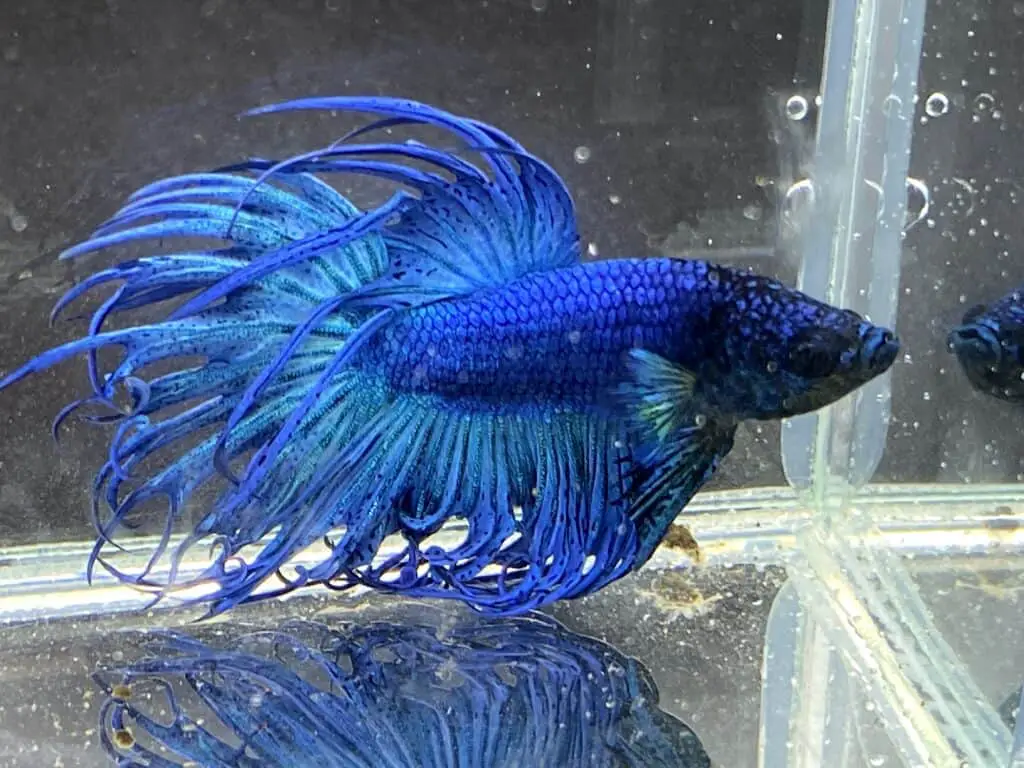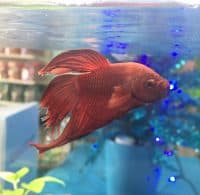Betta fish are known for their vibrant colors and their ability to survive in small tanks. However, many people make the mistake of overfeeding these fish, which can lead to serious health problems.
Overfeeding betta fish can cause bloating, constipation, and even swim bladder disease. As a responsible pet owner, it’s important to understand the dangers of overfeeding and to establish a regular feeding schedule to keep your betta fish healthy and happy. In this article, we will explore the dangers of overfeeding betta fish and provide tips on how to properly feed these beautiful creatures.
Overfeeding your Betta fish can lead to a variety of health problems, including bloating, constipation, and swim bladder disorders. Additionally, uneaten food can pollute the aquarium water, leading to harmful bacteria growth. To avoid these dangers, feed your Betta fish a small amount of food once or twice a day, and remove any uneaten food after a few minutes.

The Dangers of Overfeeding Betta Fish
Betta fish, also known as Siamese fighting fish, are popular aquarium pets due to their vibrant colors and easy maintenance. However, overfeeding these fish can lead to serious health problems. In this article, we will explore the dangers of overfeeding betta fish and how to prevent it.
1. Obesity
Overfeeding is the most common cause of obesity in betta fish. When they consume more food than they need, the excess calories are stored as fat. This can lead to a variety of health problems, including swim bladder disease, which can cause the fish to float or sink uncontrollably.
To prevent obesity, it is important to feed your betta fish the right amount of food. A good rule of thumb is to feed them once or twice a day, with only a few pellets or flakes at a time. You can also offer them live or frozen food, such as brine shrimp or bloodworms, as a treat.
2. Digestive Issues
Overfeeding can also cause digestive issues in betta fish. When they eat too much, their digestive system can become overwhelmed, leading to bloating, constipation, or even internal damage.
To prevent digestive issues, it is important to feed your betta fish a balanced diet that includes both protein and roughage. Pellets and flakes are a good source of protein, while live or frozen food can provide roughage. You can also offer them blanched vegetables, such as zucchini or spinach, as a source of fiber.
3. Water Quality Issues
Overfeeding can also lead to water quality issues in your aquarium. When uneaten food accumulates in the tank, it can break down and release harmful toxins, such as ammonia and nitrite. This can lead to algae growth, cloudy water, and even fish death.
To prevent water quality issues, it is important to feed your betta fish only the amount of food they can consume within a few minutes. Any uneaten food should be removed from the tank immediately. You can also use a gravel vacuum to clean the substrate and a filter to remove any excess debris.
4. Aggressive Behavior
Overfeeding can also cause aggressive behavior in betta fish. When they are fed too much, they may become territorial and attack other fish in the tank. This can lead to injuries or even death.
To prevent aggressive behavior, it is important to feed your betta fish a balanced diet and to provide them with plenty of space and hiding places in the tank. You can also separate them from other fish if necessary.
5. Shortened Lifespan
Overfeeding can also shorten the lifespan of betta fish. When they are constantly exposed to excess food and poor water conditions, they may become more susceptible to diseases and other health problems.
To promote a longer lifespan for your betta fish, it is important to provide them with a healthy and balanced diet, clean water, and a stress-free environment. You can also monitor their behavior and health regularly to catch any issues early on.
In conclusion, overfeeding betta fish can lead to a variety of health problems, including obesity, digestive issues, water quality issues, aggressive behavior, and a shortened lifespan. To prevent these dangers, it is important to feed your betta fish a balanced diet, provide them with a clean and stress-free environment, and monitor their behavior and health regularly. By doing so, you can enjoy the beauty and companionship of these fascinating fish for years to come.
Frequently Asked Questions
Here are some commonly asked questions about the dangers of overfeeding betta fish.
What happens if you overfeed a betta fish?
Overfeeding a betta fish can lead to various health problems. When they eat too much, their digestive system may not be able to handle it, leading to constipation, bloating, and swim bladder disorder. The swim bladder is a vital organ that helps the fish regulate its buoyancy and swim properly. When it’s not functioning correctly, the fish may struggle to swim or float uncontrollably.
In addition, uneaten food can pollute the water, leading to poor water quality, which can cause further health issues for the fish. Overfeeding can also lead to obesity, which can shorten the fish’s lifespan.
How much should you feed a betta fish?
As a general rule, you should feed your betta fish no more than what they can consume in two to three minutes, twice a day. Betta fish have small stomachs and can easily become bloated if they eat too much. You can feed them a variety of foods, such as high-quality pellets, frozen or live food, and treats like bloodworms or brine shrimp.
It’s essential to avoid overfeeding your betta fish, as it can lead to various health problems. If you’re not sure how much to feed your fish, consult with a veterinarian or a reputable pet store for advice.
What are the signs of overfeeding a betta fish?
The signs of overfeeding a betta fish include bloating, constipation, swim bladder disorder, and obesity. You may notice that your fish is struggling to swim, floating uncontrollably, or having difficulty staying upright. You may also see that their belly is swollen or distended. Poor water quality is another sign of overfeeding, as uneaten food can quickly pollute the water and cause harmful bacteria to grow.
If you notice any of these signs, it’s crucial to adjust your feeding routine and reduce the amount of food you give your betta fish. You may also need to clean the tank more frequently to maintain good water quality.
How often should you feed a betta fish?
You should feed your betta fish twice a day, with no more than what they can consume in two to three minutes at each feeding. It’s essential to maintain a consistent feeding schedule and avoid overfeeding, as it can lead to various health problems.
If you’re going on vacation or need to leave your fish for a few days, you can purchase an automatic feeder that dispenses food at regular intervals. However, it’s crucial to test the feeder before leaving to ensure that it’s working correctly and not overfeeding your fish.
How can you prevent overfeeding your betta fish?
The best way to prevent overfeeding your betta fish is to establish a consistent feeding routine and only give them the amount of food they can consume in two to three minutes, twice a day. You should also avoid giving them too many treats or feeding them live food too often. It’s essential to monitor your fish’s behavior and look for signs of overfeeding, such as bloating or constipation.
If you’re not sure how much to feed your betta fish, consult with a veterinarian or a reputable pet store for advice. It’s also crucial to maintain good water quality by cleaning the tank regularly and removing any uneaten food from the water.

Don’t Over Feed Your Fish! But Why? You Oughta Know Over Feeding Kills Fish!
In conclusion, it is important to be mindful of the dangers of overfeeding Betta fish. While it may be tempting to give your fish extra food, excess feeding can lead to serious health problems. Betta fish are prone to obesity, constipation, and bloating, which can cause discomfort and even death.
To ensure the health and longevity of your Betta fish, it is important to maintain a consistent feeding schedule and only give them the recommended amount of food. Remember, Betta fish have small stomachs and require only small portions. Overfeeding can lead to a variety of health problems, so it is best to err on the side of caution.
In summary, by being aware of the risks of overfeeding and practicing responsible feeding habits, you can help your Betta fish live a happy and healthy life. With proper care and attention, your Betta fish can thrive and bring joy to your home for years to come.
